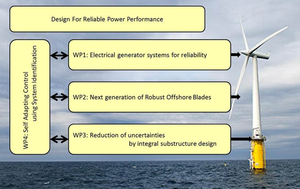Design for Reliability (D4REL)
Background
To operate a low cost offshore wind power plant, the energy production and operational life must be predictable, reliable and controllable. Current offshore wind power plant technology does not yet fulfil these requirements sufficiently, impairing the 2020 targets for offshore wind energy in the Netherlands and in European countries.
Despite considerable previous research in this field, the reliability and robustness of the wind turbines is still insufficient.
Increased reliability and controllability for wind turbines can be achieved by a new design approach based on a fault tolerant and integral design, and further improved by using system identification techniques aimed at a robust and fault tolerant control of the turbine.
Goal/ objective
The main objective of the project “Design for Reliable Power Performance” is: to improve the reliability and controllability of offshore wind turbines to reduce the operational uncertainty of future offshore wind power plants.To realize this objective the project is subdivided in four Work Packages (WP) that have the following sub-objectives:
- Improve the availability of the electrical generator systems by using modular conversion system concepts that are fault tolerant, re-configurable and self-healing
- Generate the knowledge to reduce the uncertainty in the aerodynamic performance and the reliance on failure prone features, allowing for larger and lighter offshore wind turbine blades
- Increase reliability and decrease the impact of uncertainty in the cost of the support structure by using integral probabilistic structural design techniques
- Develop self-adaptive control algorithms dealing with the variability and uncertainty in environmental conditions and system response (e.g. water depth changes due to tides and/or scour, ice formation, etc.)
- Substitute unplanned with planned maintenance by bridging the gap between existing condition monitoring and fault tolerant control schemes
Work programme
To realize the goals of the project fundamental and industrial research will be conducted. This project focuses mainly on fundamental research, carried out by PhD students of the Delft University of Technology and ECN. Siemens and ECN are also involved in more industrial research which feeds into the fundamental research developed at ECN and TUDelft, providing both a framework for the research questions (need and possible impact) and for the implementation and validation of the expected deliverables. The R&D results can all be shared with the larger community. The activities of ECN on support structures is performed in close consultation with the project partners Ballast Nedam, IHC Hydrohammer and van Oord.
The research in the project is carried out in four work packages (WP’s)
- WP1: Electrical generator systems for reliability (work package coordinator TUD)
- WP2: Next generation of robust offshore blades (work package coordinator ECN)
- WP3: Reduction of uncertainties by integral substructure design (work package coordinator ECN)
- WP4: Self adapting control using system identification for robust control (work package coordinator ECN
- 4.1: Nonlinear system identification with uncertainty quantification
- 4.2: System identification to allow for FTC (fault tolerant control): self-adapting control
- 4.3: Evaluation of integral impact at system level of technology improvements from WP1, WP2, WP3, and WP4.

Outcome
The Cost of Energy of offshore wind farms is reduced by integral reduction of uncertainties; design for reliability and system identification are applied to re-assess the safety factors and reduce operational uncertainty of the offshore wind turbines.
Project team members
- ir. Yasin Gunes
- dr.ir. Jan-Willem van Wingerden
Other key researchers from Delft University of Technology are:
- Henk Polinder, Braham Ferreira, Jelena Popovic-Gerber, Carlos Ferreira, Fulvio Scarano, Gerard van Bussel and Michel Verhaegen.
Keywords
Wind energy, system identification, fault-tolerant control, integral design, power electronics, aerodynamics.
Sponsored by:
TKI Wind op Zee
Partners:
Delft University of Technology, Energy Research Centre of the Netherlands, Siemens, Ballast Nedam, ICH Hydrohammer, Van Oord, Eneco